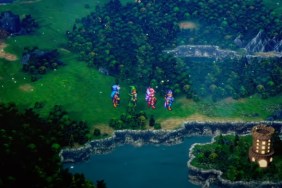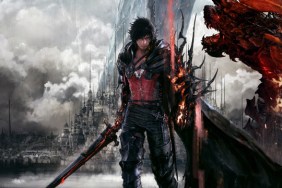To understand Square Enix's present and future, you must understand its past.
The company existed as two separate entities, Squaresoft and Enix, until April 1, 2003. The date is conveniently the first day of the new fiscal year and a day for hilarious practical jokes, so a lot of fans thought the merger was just a prank pulled by collaborating writers. Rumors had been flying about a merger, and similar jokes had been pulled before.
It didn't help that my own editor at the time wrote the story so humorously that readers didn't know what to think. The timing and brilliance of it still make me smile. (Can you tell he's the guy who trained me?)

The companies made their splashes in console gaming in the '80', with Enix's Dragon Quest (known in North America as Dragon Warrior up until part VIII) and Squaresoft's Final Fantasy. Both were tremendously successful, and, within a sequel or two apiece, the companies became rivals.
The similarities are obvious and plentiful, but the companies, along with their respective flagship franchises, came with their undeniable distinctions as well. After sequels began to roll out, Final Fantasy established itself as a series that would keep only the fundamentals while changing greatly from game to game, while Dragon Quest was the Yin to FF's Yang. Changes though there were, Dragon Quest was the franchise that held more tightly to its core than FF—not even necessarily by developer choice but by fan base demand.

Had the internet existed in its current form back in 1987, complaints would have drowned Enix boards about DW2's introduction of a party system and desertion of the solo adventurer. Even decades later, when the Nintendo DS's Dragon Quest IX was announced as an action RPG, the fanbase reacted so harshly that the developers backtracked and changed the gameplay. So too was the situation in the '80s and '90s.
That'll Cost Exactly… All of Your Gil
Both sides, particularly the Squaresoft end of things, have been through financial scrapes. Before the days of fame and announced announcements, specifically the late 1980's, Square (the company) found its PC and NES Disc System software selling poorly and was about to call it quits. The name "Final Fantasy" actually came from the expectation that it would be the group's last hurrah. You might recognize Square's earliest stateside NES games like 3-D World Runner and Rad Racer, but these games were only mid-level hits, neither selling enough to balance out the duds dropping across the sea.
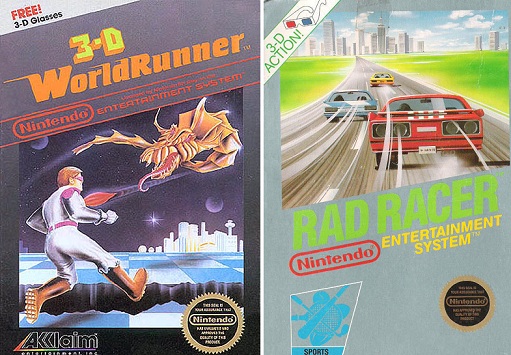
Final Fantasy, as it turned out, was so successful that it saved the company. Square therefore used the brand as a tent pole for some time, churning out sequels regularly and using the treasure chests of money to fund other '90s hits like Secret of Mana, Romancing SaGa, Chrono Trigger, Brave Fencer Musashi, and Parasite Eve. Even when the first SaGa games came to North America, they were renamed "Final Fantasy Legend" as a marketing cash-in. It would be like Marshmallow Mateys being called "Awesome Lucky Charms."
Through Final Fantasy, Square's development prowess became apparent to the rest of the world, and it was called by Capcom to help with the original Breath of Fire and by Nintendo to make Super Mario RPG.
Flying Too Close to the Sun
By 2001, Final Fantasy became so popular and was synonymous with strong console game narratives, that Squaresoft gave the greenlight to a glitzy, CG, pretentious—and most importantly, expensive—Final Fantasy feature film. But that alliteration wouldn't be the only 'F' to be heard around Square headquarters after the movie's release.
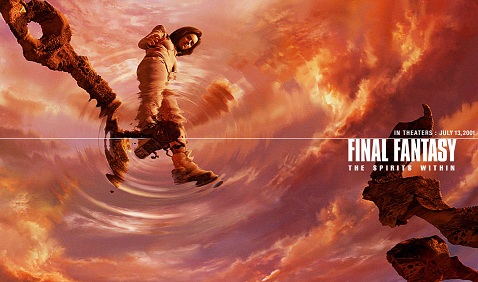
Yep, I'm talking about a special, four-letter F-word that we all think of in hard times: flop. It seemed fans didn't actually want a Final Fantasy movie after all—or at least, not one that wasn't based on any of the games. Terrible word of mouth and general lack of interest killed any hopes of turning a profit. Quite the opposite, Final Fantasy: The Spirits Within bombed hard, pushing the company right back to where it was in 1987: the verge of bankruptcy. It had come full circle.
Enix, meanwhile, was swimming in shallower seas. Its games were only moderate financial successes internationally, but the company did have its followers, and Dragon Quest had spent over a decade printing money in Japan. It had suffered through some delays and had financial problems of its own, but by comparison to Square, Enix seemed like a crowd of kings. They showed up to Square headquarters with a suitcase full of money and also some handguns and walked away with a new corporate partner, bound to a chair by rolls of duct tape.
Or at least that's how I prefer to imagine it. I'm not sure why they'd duct tape someone to a chair if they were going to hand them a suitcase full of money. Oh well.
In reality, Square's financial problems didn't speed up its merger, it slowed things down. Talks had been in progress for Square and Enix to join forces for years, but Enix backed off when Square posted losses. It was actually Sony that bought up a bunch of Squaresoft stock to stop the bleeding. That's why it took till 2003 for the companies to merge, rather than the high-fiving and ass slapping to begin in 2001.
A Good Marriage.
Square Enix got things rolling right away, cranking releases in to high gear with several PS2 and Game Boy Advance releases before the end of 2004, including a Final Fantasy vs. Dragon Quest version of Itadaki Street.
Among the titles immediately sent to market, we saw a continued pattern of reliance upon Dragon Quest and Final Fantasy. Advancements in hardware meant the ability to retell old tales. The earliest Dragon Quest and Final Fantasy had already seen newer versions, but now things really took off. Fans wanted it, and the company was happy to deliver. Enhanced ports and remakes were no stranger to the companies when separate, as Enix had given had given remake treatment to Dragon Quest IV, taking it from NES to PlayStation; while Square ported SNES RPGs Chrono Trigger, Final Fantasy IV, V, and VI to Sony's console as well. Fans requested the re-releases, and in many cases, the companies were glad to provide.
 Above: A clip from The G.I.A's interview with Hironobu Sakaguchi on the topic of relying on Final Fantasy.
Above: A clip from The G.I.A's interview with Hironobu Sakaguchi on the topic of relying on Final Fantasy.Joining together wasn't the end of the merger road, either, as the company later bought Taito and Eidos. These days, we regularly see Hitman and Tomb Raider—not originally having anything to do with Square or Enix—promoted under the company's expanding umbrella.
One-Winged Pony, One-Trick Angel, or Something
Final Fantasy X-2 marked the first time a Final Fantasy had received a direct sequel, yet its characters and world were in some ways turned entirely upside-down. If Square had been in better financial shape, might that game's systems and gameplay been used for a new IP rather than tapping the FF well once again? We'll never know.

The fear of bankruptcy is similar to the fear of having your party wiped out in any number of Square Enix's games, and they've taken measures to make sure that never happens, so we see a reluctant clinging to these two names time and time again. Kingdom Hearts is a younger addition to the family, but even that can trace some of its initial success to the inclusion of Final Fantasy characters.
Even when Square Enix is taking flack from angry fans about not delivering certain Final Fantasy or Dragon Quest games in a timely fashion, the company is still putting out numerous titles under those monikers. In addition to the ports and remakes, side stories like Dragon Quest Monsters, Final Fantasy Type-0 roll out, each franchise getting a new MMORPG and music game too. New guy Kingdom Hearts has meanwhile seen some form of release every year since 2009 (when you count the JP-only Birth by Sleep: Final Mix).
While it's easy for jerkoffs like me to make demands and say what they should do, it's hard to argue with the strategy of sticking to a proven survival instinct. Humans like to eat when they're hungry, sleep when they're tired, and we all… wow, I am delving really deep into self-examination here.
The Foot Bullet Heard Round the World
By the late 2000's, Square had also become much more keen on multiplatform releases. Technology helped, of course, as you don't need to be a programmer to realize that the Xbox 360 and PS3 are probably a lot more similar than the N64 and PlayStation were in their formats and all that jazz. While most Final Fantasy games had stuck to one platform (remakes not withstanding), Final Fantasy XIII broke that trend by being multiplat right from release day. This made a lot of people angry, because as it turns out, a lot of them are fucking stupid.

These days, when a new Final Fantasy is announced, you can usually count on it being multiplatform.
Eyes On Me
As we head into GDC, Square Enix's next move isn't hard to predict. Expect media blitzes beating the Final Fantasy and Dragon Quest drums, along with perhaps occasional appearances of surprise hits Bravely Default and Life Is Strange.
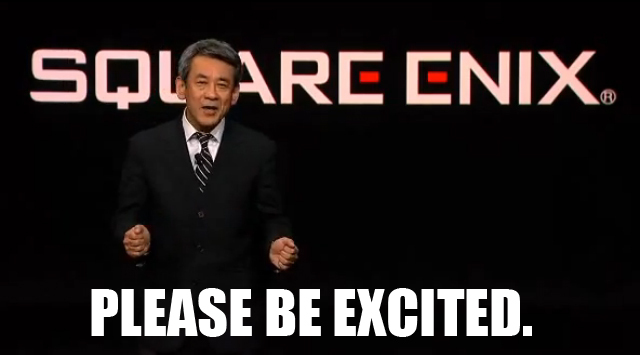
Square Enix developed Crystal Tools, its own engine for Final Fantasy XIII and its spinoffs, but seems to have left it behind with the old generation, apart from its continued use in MMOs. The company is back in preservation mode, after the disastrous launch of Final Fantasy XIV, the extremely long development cycle of Final Fantasy XV, and stupid expectations.
Future releases from Square Enix include:
Feb. 26 – Dragon Quest Heroes (JP date, NA and EU coming later)
March 17/18/19 – Final Fantasy XV Demo Including Final Fantasy Type-0 HD (NA, EU, JP)
March 26 – Theatrhythm Dragon Quest (JP date only, so far)
April 23 – Bravely Second: End Layer (JP date only, so far)
2015 Unspecified: Rise of the Tomb Raider, Just Cause 3, and the remaining four Life is Strange episodes.








